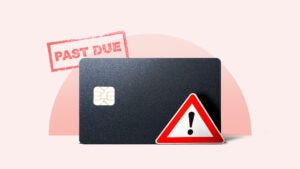How to avoid late credit card payment fees

Key takeaways
- Setting up automatic payments ensures you’re never late. You can choose to pay the minimum due, the full statement balance or a fixed amount monthly.
- If you’re not using autopay, schedule calendar alerts or reminders in advance of the due date. Paying several days early can help avoid processing delays, especially on weekends or holidays.
- If a payment is late, act fast by paying the balance as soon as possible, contacting your issuer or requesting a fee waiver. Some issuers may forgive a first-time late fee, especially if you ask promptly.
While the thought of paying a credit card bill isn’t thrilling for anyone, it’s an unavoidable truth of being a cardholder. What’s also true is that being late on payments can cost you even more than you bargained for.
Missing a credit card payment can mean getting hit with late fees, penalty APRs and dings to your credit score. However, there are ways to get ahead of your bills and even recover from missed payments with little harm done.
Ways you can avoid late fees
Late credit card payments can lead to costly fees and damage your credit score, but they’re easy to avoid with a few proactive steps. Here are some effective ways to stay on top of your due dates and keep late fees at bay.
Locate the late fee warnings in the fine print
If you want to know how much your credit card charges in late fees, check the fine print. Your credit card statement, whether you get it in the mail or retrieve it online, should have information about late fees. This information is usually on the first page of your statement, under the heading “Late Payment Warning.”
The fine print might also warn you that late payments will result in a penalty APR — meaning your credit card interest rate will go up. If you don’t pay off your credit card in full every month, having a penalty APR applied to your balance could end up costing you a lot of money. If you do get stuck with a penalty APR, it should return to your regular APR after six months of on-time payments.
How much late fees can cost you
Previously, the Consumer Finance Protection Bureau (CFPB) had set limits on how much credit card companies can charge in late fees. However, the CFPB no longer enforces any federal fee caps specifically on late credit card fees. Instead, card issuers continue to abide by the broader requirements of the Credit Card Accountability Responsibility and Disclosure Act (CARD Act), which mandates that penalty fees be “reasonable and proportional” to the violation.
Typically, late fees can be as high as $41 for repeat violations, with around $30 to $32 being common for first-time misses. However, these numbers come from individual issuer policies, not federal regulation.
Keep in mind that the late fee can never be higher than the minimum payment due on the credit card. In other words, if your minimum payment is $25, your late fee can be no higher than $25.
How to appeal a late fee
If you miss a payment, don’t panic — as many credit card issuers are willing to waive a late fee, especially if it’s your first time. Here are a few ways you can try to appeal a late fee:
- Make the payment immediately. Pay the overdue amount as soon as possible to minimize further consequences.
- Call your card issuer. Contact customer service and explain that the missed payment was accidental.
- Request a fee waiver. Politely ask if they can remove the late fee, particularly if you have a history of on-time payments.
- Ask about penalty APR removal. If your interest rate increased due to the missed payment, request a review or reversal of the penalty APR.
- Prevent future issues. Set up payment reminders, enroll in autopay, or adjust your due date to avoid missing payments again.
The bottom line
While it’s never advisable to form a habit of making late payments, accidental cases are not the end of the world. Be honest with yourself about any disorganization or lapses in memory when it comes to managing due dates, and take some practical steps to protect yourself moving forward.
Why we ask for feedback Your feedback helps us improve our content and services. It takes less than a minute to complete.
Your responses are anonymous and will only be used for improving our website.






